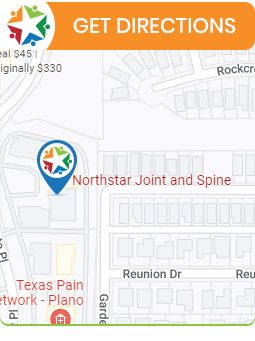Interventional Pain Management in Plano, TX
Interventional pain management involves using minimally invasive techniques to manage chronic pain, often targeting the source of discomfort through injections, nerve blocks, or other procedures. These treatments can help reduce pain, improve mobility, and enhance quality of life. At Northstar Joint and Spine, Board Certified Dr. Robert J. Nocerini, MD, provides personalized interventional pain management to address various musculoskeletal and spinal conditions. For more information, contact us today or schedule an appointment online. We are conveniently located at 7704 San Jacinto Pl Suite #200 Plano, TX 75024.


Table of Contents:
What is interventional pain management?
What types of conditions are treated with interventional pain management?
Is interventional pain management suitable for chronic pain conditions?
What is the success rate of interventional pain management for chronic pain relief?
Advanced Pain Solutions from Dr. Robert J. Nocerini, MD in Plano, TX
Interventional pain management refers to a specialized approach that focuses on treating pain through targeted procedures designed to interrupt pain signals at their source. Instead of relying solely on medication or general therapies, this form of care uses image-guided techniques like nerve blocks, injections, and minimally invasive procedures to isolate and address the root cause of discomfort. These treatments are often performed in a clinical setting and are tailored to each individual, depending on where the pain is coming from and how it behaves over time. By concentrating on the specific pain pathways involved, the approach can provide both short- and long-term relief while preserving mobility and reducing reliance on medications. It doesn’t replace other forms of therapy but can be an integral part of a patient’s care plan, particularly when conservative measures haven’t delivered consistent relief. The goal is to limit the impact that pain has on daily function while also helping to prevent that pain from becoming more widespread or disabling. At Northstar Joint and Spine, interventional methods are often used in combination with physical rehabilitation or other conservative measures to help restore comfort and range of motion without major disruption to the individual’s routine.
Interventional pain management is designed to address a wide range of pain-generating conditions that tend to persist or worsen without direct intervention. Commonly, these treatments are applied to cases involving back and neck pain, joint discomfort, nerve-related issues, and degenerative changes tied to aging. Conditions like spinal stenosis, herniated discs, facet joint inflammation, and arthritis may all benefit from image-guided procedures that help isolate the inflamed or irritated structure and reduce its impact on surrounding tissue. When a nerve becomes compressed or inflamed, for example, a well-placed injection can bring down swelling and ease the corresponding symptoms.
Beyond musculoskeletal causes, this approach can also target neuropathic pain and syndromes that stem from complex nerve signaling problems. Individuals with conditions like sciatica or sacroiliac joint dysfunction may respond well to interventional methods, especially when flare-ups are frequent or limit day-to-day activities. Treatment is adjusted based on the type, location, and severity of the discomfort. The procedures are precise by design, often carried out with the support of imaging technology to make sure the relief reaches exactly where it’s needed most. The focus remains on maintaining function and helping patients return to movement without putting additional strain on the body.
For many individuals dealing with chronic pain, interventional methods offer a path toward lasting relief when more traditional treatments fall short. These procedures are often used after lifestyle modifications, physical therapy, or medication have only partially helped, or when they no longer produce consistent results. Because chronic pain tends to be persistent and resistant to change, the ability to target specific nerves or joints directly makes interventional care especially valuable. These treatments work by interrupting the pain cycle and reducing inflammation or nerve irritation at its source, rather than masking symptoms.
This approach is particularly suited for chronic conditions that have a clear anatomical or neurological basis. Inflammation in a particular joint, a pinched nerve, or a worn spinal disc can be addressed in a way that doesn’t require major surgery or long-term medication dependence. Depending on the nature of the condition, patients may receive periodic treatments as part of a longer-term management strategy. The specialists at Northstar Joint and Spine often use these tools to reduce pain and to improve function, helping individuals regain the ability to stay active and avoid further physical decline. When used alongside other therapies, it becomes part of a larger effort to restore comfort and mobility over time.
The effectiveness of interventional pain management depends on several factors, including the type of condition being treated, the location of the discomfort, and how early intervention begins. For many chronic pain patients, targeted procedures offer a noticeable improvement in daily symptoms, sometimes lasting weeks or even months at a time. While no single treatment works the same way for everyone, image-guided approaches like nerve blocks, radiofrequency ablation, or epidural injections have been shown to reduce pain and improve function in a significant number of individuals, particularly those who respond early and follow through with recommended follow-up care. The goal with these treatments isn’t always to eliminate pain entirely, but rather to reduce its intensity and frequency enough that individuals can return to regular activities with less interference. In cases where procedures are repeated at intervals or paired with strengthening and rehabilitation, the cumulative benefit can be substantial. Most patients see the greatest success when interventional methods are part of a broader plan that also addresses posture, strength, and body mechanics. That integrated model gives the patient a better chance at sustained relief rather than short bursts of improvement. The providers at Northstar Joint and Spine assess each case individually to determine which options are most likely to deliver lasting benefit based on the patient’s condition and response to care.
For residents of Plano, TX, who are experiencing chronic pain, Dr. Robert J. Nocerini at Northstar Joint and Spine offers advanced interventional pain management therapies designed for lasting relief. Dr. Nocerini understands that pain can be a complex issue requiring a targeted and comprehensive approach, which is why he focuses on identifying and treating the root cause rather than just masking symptoms. His mission is to help you regain your mobility and live with greater ease, providing effective and personalized treatment options right here in your community.
If you’re tired of temporary fixes for persistent pain, it’s time to explore a better path forward with a board-certified specialist. Dr. Nocerini’s approach at Northstar Joint and Spine prioritizes effective, long-term solutions, providing hope and a path toward recovery for those whose daily activities are disrupted by discomfort. By focusing on the source of your pain, he helps you find true relief, empowering you to move forward with confidence.
Interventional pain management is available at Northstar Joint and Spine. For more information, contact us today or book an appointment online. We are conveniently located at 7704 San Jacinto Pl Suite #200 Plano, TX 75024. We serve patients from Plano TX, Willow Bend TX, Frisco TX, Allen TX, Addison TX, North Dallas TX, and surrounding areas.

Check Out Our 5 Star Reviews


Additional Services You May Need
▸ Back Pain
▸ Shoulder Pain
▸ Chronic Pain
▸ Epidural Steroid Injections
▸ Spinal Cord Stimulation
▸ Viscosupplementation
▸ Genicular Nerve Blocks
▸ Facet Injections
▸ Joint Injections
▸ Sacroiliac Joint Injections
▸ Lumbar and Cervical
▸ Facet Medial Branch Blocks
▸ Diagnostic Nerve Blocks
▸ Medication Management
▸ Neck Pain Doctor
▸ Diabetic Peripheral Neuropathy
▸ Headaches
▸ Suboxone
▸ Botox for Migraines
▸ Peripheral Nerve Stimulation
▸ Spine
▸ Joints
▸ Muscles
▸ Bones

Additional Services You May Need
▸ Back Pain
▸ Shoulder Pain
▸ Chronic Pain
▸ Epidural Steroid Injections
▸ Spinal Cord Stimulation
▸ Viscosupplementation
▸ Genicular Nerve Blocks
▸ Facet Injections
▸ Joint Injections
▸ Sacroiliac Joint Injections
▸ Lumbar and Cervical
▸ Facet Medial Branch Blocks
▸ Diagnostic Nerve Blocks
▸ Medication Management
▸ Neck Pain Doctor
▸ Diabetic Peripheral Neuropathy
▸ Headaches
▸ Suboxone
▸ Botox for Migraines
▸ Peripheral Nerve Stimulation
▸ Spine
▸ Joints
▸ Muscles
▸ Bones






